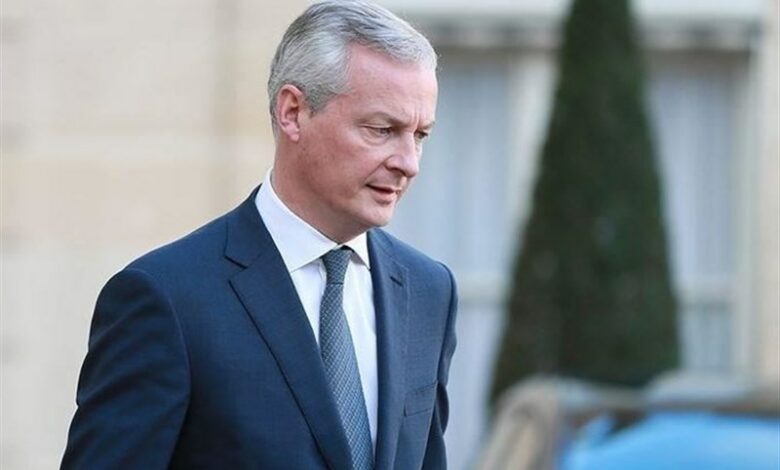France’s credit is under pressure from a high budget deficit

| While the National Statistics Agency of France has announced that the country's budget deficit is much higher than expected, the country's finance minister has admitted that he has not reached his goals in the field. |
According to the international group Tasnim news agency, the German newspaper “Handelsblatt” wrote in an article: deficit The French budget is significantly higher than expected. In this situation, the domestic political pressure on French President Emmanuel Macron is increasing.
This report states: France’s general financial situation is much worse than expected. France’s national statistics agency Insee announced on Tuesday that the country’s budget deficit reached 5.5 percent of gross domestic product (GDP) last year. The government had expected 4.9 percent – even with that, Paris was a long way from the EU’s three percent limit.
€154 billion is missing from a balanced budget in 2023, according to Insee. “We have not reached our goals,” French Finance Minister Bruno Le Maire admitted. We have to draw conclusions from these conditions.”
Lomer also justified the budget deficit, including with lower tax revenues. According to him, in addition, the growth of the French economy had also weakened. Meanwhile, Paris had based its budget forecasts on very optimistic GDP assumptions and therefore expected a lower deficit percentage. but these calculations did not come to fruition and it is unlikely that the government’s 4.4% deficit forecast for this year will be maintained.
Accordingly, the absolute national debt in France may increase to 3.2 trillion euros by the end of the year. ; No other EU member owes as much in absolute terms. Regarding GDP, France’s debt is 110%.
According to Insee statistics, Paris now has the second largest budget deficit among its members, only in Italy the gap between government spending and annual income 2023 was more. In Germany, the national budget deficit was significantly lower at 2.1 percent.
This reality shock could hardly have come at a worse time for French President Emmanuel Macron. This official balance sheet of the budget was published before the judgment of major rating agencies Fitch and Moody’s at the end of April and Standard & Poor’s at the end of May. Thus, during the European election campaign, Macron is under the threat of a downgrade. It has its own credit. The French opposition is already discovering and surfing this issue. Eric Ciotti, head of the conservative-bourgeois Republicans, believes that his country is now “on the same path as Greece”. According to him, the rapid deterioration of public finances threatens to weaken France’s position in Europe and could also become a stability problem for the eurozone as a whole.
The EU Commission in Brussels declined to comment on the Paris budget deficit shock on Tuesday. A spokesperson of this European institution only said about this: These figures have been taken into account. They will now be reviewed and approved by the EU statistics agency Eurostat by the end of April.
The fact that the budget deficit is now 5.5% instead of 4.9% does not change the Commission’s approach. It had previously been taken for granted that Brussels would launch excessive deficit cases this autumn against France and other EU countries for breaching the Maastricht criteria. After a four-year suspension due to the corona pandemic, the European debt rules have been re-enforced since the beginning of this year. reduce the deficit percentage to meet another requirement of the Stability Pact. According to him, the French finance minister must ensure that the debt ratio is on a sustainable downward path after four years. It will be monitored.
First, the European Commission advises how debt and deficit can be brought down. Accordingly, France must prepare a new multi-year budget plan. This, in turn, must be approved by the Council of EU Member States. They can reject the Paris plan if they believe it is not good enough.
If Paris misses its targets, other member states can impose penalties. However, this has never happened before because governments do not want to sanction each other.
However, the pressure on Macron and Lemur is now enormous, including from within their own country. Francois Villeroy de Gaulle, head of the Bank of France, regularly calls for fiscal consolidation. “Deficits in France are weighing on our credibility in Europe,” he recently told Figaro newspaper.
In mid-March, the French Audit Office issued unusually strong criticism of Macron’s budget policy. It warned that the government’s financial situation is “serious” and “worrying”. Accordingly, budget cuts of at least 50 billion euros are necessary to meet the 3 percent deficit again in 2027 as planned.
Pier Moscovici France is facing “unprecedented austerity efforts in modern history,” the head of the Audit Office said. According to him, the 2025 budget will likely be the “cruelest budget since the financial crisis” more than a decade ago.
The French government seems to have realized that a change in fiscal policy is inevitable. Last Wednesday, Macron spoke to his loyal followers about the state of the government’s finances in an evening crisis meeting.
In February , Lommer announced a 10 billion cut in the current budget and the finance minister spoke of an “emergency brake”. A supplementary budget with further cuts could follow in the summer. Savings of at least €20 billion for 2025 are under discussion. But whether this is enough is open to question.
According to Muscovisi, France’s maneuvering space is in danger of being significantly reduced. This year alone, this country will pay 57 billion euros in dividends. This burden has more than tripled from 2021.
The head of the Audit Office believes that France must now act wisely and reduce the deficit and debt without jeopardizing growth.
end of message/
| © | Webangah News Hub has translated this news from the source of Tasnim News Agency |


